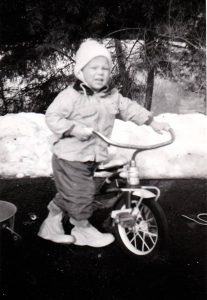
7×1
I didn’t set out in life to be a driver but I’ll admit I enjoy it. I remember the day I learned to ride a bike. Suddenly my world multiplied. I was seven. I rode that bike all the way past two friends’ houses and back. What liberation! And I had a meaning of life moment. I theorized at that young age that every seven years there would be a total break through. That bike was a symbol of breaking on through to the other side. I don’t know why my mind thinks on profound things when my body is in motion. It just does. From the age of seven this has held true. Somewhere in the wings there may have been someone who gave me the idea that every seven years a human person will experience some major mind and life shift that elevates them to a new plateau. But I don’t remember them saying it. This thought may have been entirely my own.
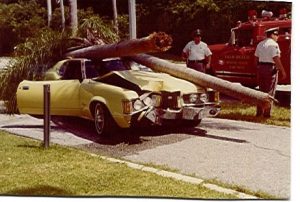
7×2
Driving cars didn’t happen until I was fifteen, so the seven year theory had to be stretched, unless we include non-driving type changes like … puberty. Yes, discovering sexuality. That can change a life view. Who would question it? Mom’s Cougar was the first car I drove. It turned out to be a miracle car. She survived a horrible accident in it and that ended my days with the Cougar. My search for ladies would have to start in my Dad’s Cadillac, before I wrecked it, that is. Sorry Dad. My mind was on women. It’s a good thing nobody was killed. But no. That was just a driving lesson in the School of Hard Knocks. Puberty began a journey of imagination that couldn’t help but disappoint. Dad’s ever visible magazine rack of Playboy and Hustler made that a certainty for me. It also left me clueless as to what the female gender actually was. My sister wasn’t telling me. She had her own problems. My mother waited way too long to talk about it and her only words of advice were issued at a moment I wasn’t concentrating much, with her head popping in the door during an episode of Gilligan’s Island. Wait until I’m married to have sex? Sure, mom. Can I please watch the show? MaryAnn’s about to come on!

7×3
Every seven years … let me think back. At twenty one I graduated from college. I often think back on that day as the day my song started. I had been a music composition major. Yes, me. “I.” I was the song. My “song” was my life and it was being composed by God. It was fitting somehow, that my parents had come up to South Carolina to hear my greatest accomplishment – a trombone sonata -only to have two major mishaps happen simultaneously. Mishap number one: in the business of packing, I had somehow lost my music portfolio. Not only did this contain all the music I had written while at college; it also contained the conductor part for the trio that needed to be performed that day. Mishap number two: none of the other musicians showed up for the performance, which then had to be canceled.
College kids these days. Imagine them skipping out on something they’d get no credit for during exam week while everyone was packing up and going home. My parents, who maintained the belief that I had never practiced with these musicians in the first place and that I was a liar, had to hear a far different tune than I had anticipated. And thus my song began. It was me. What was the song about? Well, it hasn’t ended. It seems to havestarted out as some tune about a career search, but I can’t tell you for sure at this point what the whole thing is. I’ll play it for you later.
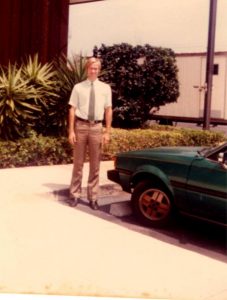
That year a career search began and it was a humbling one. I parked cars, and delivered news papers but my first real job was at a bank. If it weren’t for the women there, I would have hated that job. You wouldn’t know it now. I’ve become a successful business man. But at that time, I was hating it. At the bank I was reflecting on the fact that the entire industry was producing no real goods and services. As I saw it, forty hours out of every week, plus an hour to and from work daily, were being completely wasted, just so I could earn $5/hour. Eventually I would create something called “the ghost bank” and design the app. But back then I was thinking there was no way I was going to stay in such an industry.
It was a philosophical reflection. I thought about what an incredible waste of human effort the entire banking industry was – all the saving of money: its little deposits and withdrawals and switching accounts. Not one good or service was made by them. I considered the number of buildings in the world that were dedicated to doing nothing more than exchanging values – the stock market, the insurance business, the entire financial sector – all a waste of human effort. Yes, even the insurance business. And what do I do for a living now? Insurance. But this was then.
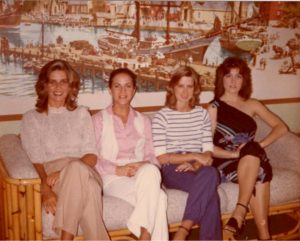
Back then I saw it all as wasted time. It was the unnecessary stuff associated with our financial system that made life very annoying for everyone, not just me – sales, advertising, commercials.
As I saw it, every human effort dedicated to all this nonsense could be re-purposed into something that directly created some widget or food item or service, or clothing that actually made life nicer for people. It was the stuff money buys and is used for. As it turns out, this was all part of Marx’s theory but at the time, I knew nothing of it. I’d never read the Communist Manifesto.
Of course, my thoughts were quite different than Karl Marx’s in most ways. I wasn’t feeling like an exploited worker, for one thing. That wasn’t it. And I didn’t think God didn’t exist or offer humanity anything worth holding onto. When I gradually learned about about Marxism in the ensuing years, there were good reasons I found not to embrace Communism and I never did. There were two main qualms I had – (1)the impossible inefficiency of centralized management, and (2)revolution. The second one bothered me the most.
At the time, we were in the middle of a cold war. Reagan was on the rise. Communism only meant one thing to me – war. So no. Communism wasn’t just unattractive to me. I was frightened by it.
I invented the HAND System instead. No labor tension or revolution was required. Still, concerned about the inefficiency of centralized management, I had no inclination to start it at that time. We lacked the necessary technology.
Back in those days, I was just figuring out who I was and what I believed in and I didn’t have a computer science degree. I believed in God and just years after that I became a Christian, allowing that Jesus could have been God incarnate. I still have doubts about Jesus being the Messiah or God incarnate. I don’t have doubts about God. I never did. But I did notice that the first church actually used something like the HAND System.
In those days I started to learn who I was but it was a long road. What’s more, my conversion from monotheism to Jesus follower didn’t occur at one of those pivotal 7 year marks. Jesus drifted in gradually, interweaving himself in the world of a doubting mind that separated things I could be certain about from things I was merely open to. I had a quite open mind really. And what actually landed on my 7×3 year was just this new song, the beginning of a story – a song that led to the revelation of a new economic paradigm – maybe something we’ll see after Jesus returns. And a song that I’m still listening to myself, so I can’t really describe it all to you. I sense its all written somewhere else – a place I call home, not as you see me now, but in what I’m made to be.

7×4
At twenty eight, I had been kicked out of the Catholic seminary I’d been attending at night while working as a letter carrier by day. Yeah, I said letter carrier. It didn’t take me long to quit the bank I hated working for. Besides, there was a hefty pay raise. And then … did I say “kicked out”? Did I get kicked out of the seminary? And wait. Wasn’t I struggling with this Jesus thing?
A lot can happen in seven years. And no, I wasn’t exactly kicked out. Basically, I had an A average but had no intention of becoming a priest and had enrolled in their lay program. I’m sure the fact that I wasn’t jumping onto anyone’s invitation to become a priest was a factor, but I also suspect the problem may have had something to do with the fact that I had become privy to some corruption of a political nature behind the scenes. Political? Really? At a seminary? Yes, I really think so. I disapproved of the support I was finding for liberation theology there. Do you know what liberation theology is? It is Communism. Or, it certainly was in Latin America at the time. I was seriously afraid of and concerned about Communism. I let my Social Justice teacher know about it. Really any sort of centralized authority freightened me. I was critical of the bishops’ statement on the economy too – and for some of the same reasons. Except for abortion, the Catholic Church was starting to seem like a wing of the Democratic Party. I like the Democrats. They seemed more compassionate, at least on the surface. They cared for the poor, it seemed. But I didn’t think the church should be taking sides with political groups.
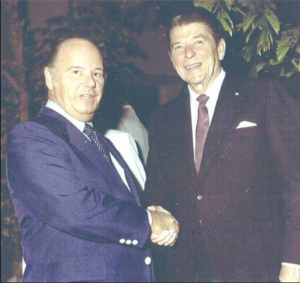
I did have my conservative influences. There is another side of this story – my dad. Dad was what they call a “country club Republican.” I actually couldn’t stand that about him. He was a very worldly man. In some ways he had a heart of gold, but in others, he was just a greedy, materialistic, capitalist. I was a politically moderate man who was in some ways influenced by a conservative father who had supported Ronald Reagan before it was popular to do so. That much is true. Dad’s opinions were to be considered. And he was a smart man and I respected him. But he didn’t dictate what I thought. Mom was a Presbyterian. He was a Catholic. In matters of religion, I had to decide for myself what the truth was. Politics was no different. I had learned to listen to people from a young age. I could hear passion. I could consider reasonable arguments. And I knew that they both could be wrong. Things that were uncertain to me, I left alone. I pondered.
The problem at the seminary was that I assumed it was okay to express my opinion. After all, that’s how I’d been raised. And in fact, I was received with open arms when I first entered the seminary and spoke idealistically of asynalagonomy, a thing Dad strongly opposed, but here’s the crux: are you ready? When I exposed the Mary Knoll nuns for shipping guns to the Sandinistas out loud in class one day, it became clear I could be trouble.
Uh huh. Suddenly, after that day, no courses were available to fill in the last few hours I needed to complete my post graduate degree. A course in Marriage and Sexuality did become available a year later but my final exam was lost by the teacher after I placed it on his desk with his other papers. Strange. When I noticed the incomplete after getting my report card in the mail, my guidance counselor told me I had taken too long to complete my matriculation and no longer qualified as a student. That is to say, I was forced out.
That was a hard year. It was the year I broke up with my second fiancé. The content of the course as I lost my place at the seminary, and lost my fiancé at the same time, was painful, but it started a new chapter in my life. And in my heart, I had hoped the next major breakthrough was going to be matrimony. But marriage was eluding me. It had been taken away from me the same way my test in Marriage and Sexuality had. I consoled myself through service in ministry as I went through a waiting period. I acquired more equipment for my music studio and for my library of theology with the money I saved by not getting married. In my enthusiasm, I took on a bit of credit card debt – not smart. Shopping therapy comes with a cost.
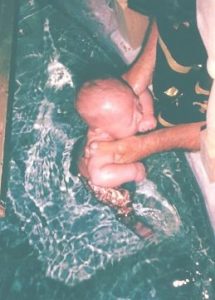
7×5
A waiting period did ensue as I healed. And then finally, despite some financial handicaps, by the age of thirty five I did find the wife I had been looking for and was on my way to having my first child. Now she had an interesting influence on me. She had rejected the Catholicism of her parents and become a born again Christian who worshiped in the Assemblies of God Church. I figured if my parents had survived a mixed marriage and I turned out okay, that shouldn’t be a deal breaker for me. And in fact, we decided to turn the wedding into a proclamation of the very fact – where two become united as one. All of them do this, really, but for us, we wanted to see a divided body of Christ come together in unity. We made a theological statement through the way we executed the sacrament. A Catholic priest came, thanks to a dispensation from the bishop, to a wedding held at Maranatha Church of God. A charismatic Southern Baptist pastor who’d lived with me for a time also co-ministereed and led the ceremony with the other two pastors. Because it was ecumenical, we didn’t have mass – just the wedding. Catholic Canon Law wouldn’t allow that. And as an aside, none of that was on the seven year mark anyway. I’m not sure that matters. You probably figured I was just giving you an outline of my life anyway. But on that subject, what did land on my year thirty five was the birth of my son, Jonathan. And Jonathan, we baptized in an Orthodox Christian Church.
Orthodox Christian? How did we get there? Well, first there is a little church history I’d been studying. Second, there was the fact that I really was open to becoming a priest and the Orthodox allow married priests. And third, it was a sort of good compromise between Catholicism and the Assemblies of God, if you think about it long enough and not too critically. So, to come up with a solution between Catholicism and Pentecostal Protestantism, we’d found Orthodoxy and indeed, when we married yet again in the Eastern Orthodox Church, I was thirty five years of age – right about the time Jonathan was born. And that’s why I used to sing a little ditty to my wife about the temple being anointed a second time. We expected Jonathan to be born around the time of Chanukah. I had hoped our decision to become Orthodox would parallel the rededication of the temple in Jerusalem. Don’t put too much into that though. It was a sort of man-generated idea of mine. There is nothing about our mixed marriage that turned into the restoration of all things. I was more like Peter running around thinking about how to build little booths at the Transfiguration. What mattered was the power of God. And that is a power that is beyond my comprehension, as well as beyond my own very inventive mind. Still, I do think that the marriage has a sacramental power that is divine, that comes from a place of authorship that is well beyond me. In fact, she is with me as one in this song of my life, being part of the writing of by divine hand, instead of by my own. It is infinitely better that way.
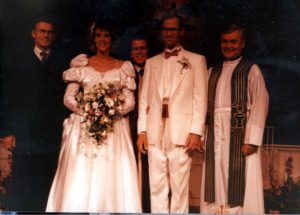
Along those same lines, in my own inventive mindset, I was hoping Orthodox Christianity would pan out differently for us than it did. Our encounter with Orthodox Christianity was, in fact, unusual from the outset. We connected with a Ukrainian group, under a bishop that thought he had the spirit of Elijah, of all things. I said what? Yes, the spirit of Elijah. He thought he was one of the two end time witnesses. This wasn’t exactly your standard fare Eastern Orthodox Christianity. But it was charming in some ways, and sort of stimulating. Reports of miracles were continuous there. In fact, if I were to describe my thirty fifth year in just one word, it wouldn’t just be “matrimony.” It would be “Elijah.” I had a pretty worn out Bible by then in my life. I was even pretty good at hard subjects, like the book of Revelation. So with someone thinking he was one of the two end time witnesses, the very fulfillment of prophecy, I took an even more intense interest in eschatology at that time. In fact, I completed my degree and taught at this self-proclaimed Elijah’s College of Eschatology, St. Michael Academy. That’s where I got my Masters Degree in Theology. I was one of the few people on the planet with a literal degree in eschatology. Most people didn’t even know what that was.
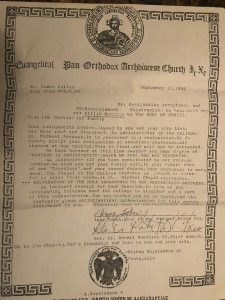
Let me bring this back to my childhood theory of sevens. It was at the age of thirty five, that I left the college with a degree and a mission, which I could only ponder the meaning of, because that bishop anointed me – on my tongue even. Have you ever tasted oil? Well, I did. I had never heard of that ritual before, of course, probably because it isn’t in any of the prayer books or their rubrics. It did seem pretty sensible though – fitting. But neither were we entirely naive. We weren’t unaware that there were more “normal” jurisdictions within the Orthodox Church, or that paradoxically, this sort of thing was “unorthodox” in the Orthodoxy. But to bring this back to the number seven, just about the time I was married yet again in the Orthodox Church through a less controversial jurisdiction of it, (the Antiochian), this Ukranian autocephalous bishop (don’t ask me what that means; it’s complicated) sent me out, granting me my Masters Degree in Eschatology, saying it would be my mission to preach in the spirit of Elijah – not to the Orthodox but to the Protestants.
That made me sort of credentialed as a missionary, but in a very odd way. But lest you think too much of it, I should be entirely upfront about it and I’ll be frank. His seminary had been perceived by many as a diploma mill. Its accreditation was with the Kentucky School of Accreditation, or something like that.
That didn’t matter. The bishop didn’t think highly of academia. As for me, he thought I was a smart person. I was a thinker. That I’ll admit. I am a thinker. Some might consider me a philosopher. I fall onto the high end of the autism spectrum. Is it okay if I admit that? And I think too much. It goes along with it. It’s ironic that he had hoped I would be more normal, when he himself was anything but ordinary. He also didn’t like that I had opinions. He just wanted to raise up priests, like the Catholics did, and prophets. He wanted to bring them in and send them out quickly. He was hoping he could raise up an army of people who would carry with them what the Lord had shared with him.
As I saw it, this was all a very tragic irony. The sectarianism of the Orthodox generally, which I oppose, was epitomized in this Elijah bishop who broke all the rules. But it wasn’t the same sectarianism as the “legitimate” Orthodox. Instead of saying anyone who wasn’t Eastern Orthodox was outside of the body of Christ as the more traditional would often say, he had been “playing nice” with the popes and the Anglicans. His sectarianism was spelled out in coming against any Protestants who didn’t recognize the real presence of Jesus in the Eucharist and who in his words, “hated Mary.” Such a strange man, he was. He had all sorts of medals and knighthoods and letters from popes. But it seemed like he was just as hateful as anyone who hated Mary.
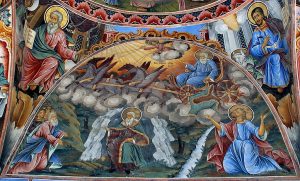
Ultimately, I was commissioned to broadcast his message but I wasn’t buying it. The only part I was sold on was Elijah. Not that he was Elijah, but that he wasn’t Elijah. But Elijah himself, the true Elijah, actually fascinated me. I wanted to know what the real Elijah would actually be like. And more broadly, I really wanted to know what was going to take place before the Lord returns. That is what the subject of eschatology is. And what I did know in all this, is that the role of Elijah, as described in the Bible, was that of restoring the church in preparation for the Lord’s return.
Even with all of my open mindedness and doubting, in the part of my mind that pondered these things, anyone who was not a part of that ministry, the ministry of Elijah, or an Elijah movement, was not listening to God. This made sense to me because if they weren’t engaging in the ministry of Elijah, then they weren’t working for the restoration of the church to the true vision, mind and heart of Jesus. Now, of course, restoration is not a concept that works well with the Orthodox any more than it does with the Roman Catholics. They’re convinced in their own minds that the gates of hell can’t prevail against the church. So in their opinion, the church can never stand in need of restoration.
It’s fascinating to me and I think it’s a matter that we should all consider very carefully if we care to be prepared when the Lord returns, if such a thing is not a myth. And the real message of Elijah, whatever that actually ultimately would be – this was something I would gladly take to the Protestants, or anywhere else such a message might be received – if only I could fully grasp what it was myself. So I prayed on it. Make sense? And I have never stopped asking to receive it. So should we all. No?So that’s what came down at the age of thirty five.

7×6
At forty two I became an Internet superstar but it was short lived. Of course, that’s a leap from where I was a paragraph ago. My readers deserve a seven year back story. So listen to what happened: my father and my oldest brother, Chickie, had died shortly after I was sent away by the bishop. After his death, I heard in a vivid dream, or perhaps it was a vision, my father saying, “total marketing.” This is an odd comment that I’ll have to explain. Dad had been the author of the “total marketing concept” (TMC), at the Allied Chemical Corporation, where he was a VP of Sales for their Chemstrand division. In this very vivid vision that I had while standing in prayer he was telling me to market totally. I pondered the meaning. And I once again confused my own thoughts with God’s. I knew my father would have wanted me to preach the Gospel on the Internet if he had lived long enough to know what the Internet was. Dad and I were very close. I knew him well. And my father’s command to market totally fit in with the bishop’s command to broadcast the message of Elijah. I may have been confused about what that all may have meant, but I was definitely hearing from multiple sources. I still wasn’t sure what that message was and then to add fuel to my confusion about how God might have been speaking through it all, the vision that day of my father was accompanied by certain unusual events at the same music studio-library I was in when I dreamt it, or saw it, as the case may have been.
Yes, by then I had a formidable music recording studio. I had built up a pretty good library there too. It was a very private place for me where I could get a lot of work done. And after my father and brother had died, that is where I kept their ashes. I kept them on a filing cabinet. I decorated the top of the filing cabinet in a nice way – to honor my father and pay respect to my brother I loved so much and missed very dearly. That place was a very sacred place of prayer for me. And it was also the same place the vision of my father occurred. And there were also many other unusual events that took place there, just as there had been at the bishop’s seminary – things people might call miracles if they were inclined to believe in them. I won’t go into what the unusual events were here. It deserves a whole chapter all by itself. But as an example, one day there was a mysterious fire that emblazoned what appeared to be an image of the Virgin Mary into my wall.
I was listening carefully to what the Lord might be saying at that time. I may have many doubts, but I’m also an open minded man and these did not seem like normal events. In fact, they were extremely improbable and I wanted to understand. And I want you, my reader, to understand something about how a certain invention of mine came about, because that invention was born at that time, in that place, in this context. And as with many plans I made in my life in response to what I thought God might be saying, I took it upon myself to enthusiastically march forward in some manner of obedience to what I was hearing – if I could only hear more clearly. But I didn’t have the full picture. I still don’t. I’m not the writer. I’m just the instrument.

Be that all as it may, it is a fact one way or the other that it was in the midst of much intensive prayer for wisdom and discernment at that time, that the Ghost Machine concept was born. It was conceived as a web site that would become a better search engine and morph one day, when mobile technology became available, for playing a game that would reward users with Ghost Bucks if they “found ghosts.” It would be set up in a way where the “ghosts” would be real historical people – icons. We’d call them “ghosticons.” It would be educational and entertaining – “edutainment.”
You see, I have to also offer that when my father and brother died, my mother was comforted by her surviving children through the Internet. We set my elderly mom up with a computer and sent emails to one another. She told us stories of my father and it did much to heal her. She outlived him by eighteen years. Mom was an incredible woman. But what I saw in this was the power of the Internet to heal. I saw the power it had to bring a family that had never had the energy to send letters to Mom, to regularly send email. We sent jokes. We told stories. We were miles apart but we were never so close. And I saw that our good memories were worth preserving. In fact, I believed they worth remembering forever. Now in Orthodoxy, we have something called icons. We remember Christian saints. But I wanted to remember all that had loved. I thought we could do more. The technology was on the verge of realization. I felt like maybe the reason I had seen the miracles I had, heard the commands that I had, received the commissioning that I had, might be about riding this wave of communication in a total marketing concept for the ministry of Elijah.

So, I came up with this idea that people could learn about history and remember loved ones as they hunted for ghosts. And to make it work, I came up with a way they could get paid for doing it. It was a very elaborate plan and the more I thought about it the better the idea kept getting. For one thing, I also figured out a way to raise money for charities – a way that would be super fun. In fact, the more the users of this app gave to charity, the more Ghost Bucks they could earn. Ghost Bucks, as I called them, were the currency of the underground economy. As the users found ghosts planted in places of business, they would receive credits – not exactly the same way as with Bitcoin, but definitely creating a crypto-currency of a sort. In fact, I’d say that the idea was qualitatively far better than any crypto-currency on the market to this day. And ironically, even though ghosts were the central theme, I rejected the term “crypto-currency.” Our ghosts had halos. I wanted to highlight the good and the holy – not the dead and the nasty. Who wants to remember that? I was about heavenly things. The world needed to be about heavenly things too. What else could the restoration of all things be?
Think about it.
Maybe you want more details. You could get them at Ghostsurfers.com, where this story is told and I’ve left the screen shots. Here, I’ll simply explain that the businesses would pay for extra customers at specified, usually slow hours, which were to be called “ghost hours.” I would hyperlink from the ghosts to the each user’s browser on their ghost positioning system (GPS) to a world of information that was entertaining. The Ghost Bucks would be redeemable for US dollars for anyone who wanted to cash them out at any time.
I was too far ahead of my time with this vision, once again running around excited like Peter wanting to build three booths. Mobile technology was a long way off. The search engine was enough of a hurdle to get over for a man without a budget or career experience or a team of helpers. I thought to myself I could teach myself how to code. I could talk some people into helping. I could save up some money working at the Post Office. But unfortunately, something strange happened at the Post Office where I was working at that time. I won’t go into that here. It’s a fascinating story in and of itself, but the upshot of it was that I had to quit my career there in 1998, much earlier than I had first planned to. And with the loss of my job came the loss of my ability to proceed with this invention successfully.
The miracles though … the fire … the dreams … the prayer. These were enough to push me to take a leap of faith. It was premature leap, but it started an important chapter of my life. It made me know loss. We started with a promising success. Web Trends reported in July 2000 that we had a 5% reach of all Internet users. This was encouraging, but without money, there was no way to buy equipment to keep it going. We were getting more than four hits per second but couldn’t sustain it. So the ghosts departed almost as quickly as they arose.
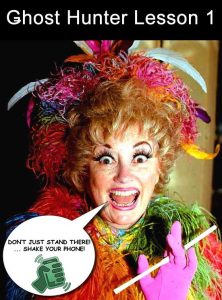
And that, my friends, was forty two. I was working from home in my pajamas. If only I had money. If only I had a team. I didn’t just learn loss that year. I learned what entrepreneurs need to turn visions into reality. It was a very expensive education. I lost everything I had. I don’t regret it though – not in hindsight. To this day, I just want to make that same vision a reality, only with an added dose of wisdom. So I’m still looking for help. And as fate would have it, as the years passed, mobile technology become an increasing reality. Even flattened by my losses and taking odd jobs like driving a taxi cab for a living, I started to design the what I called the “Ghost Machine.” I continued to build up the Ghostidex full of potential Ghosticons. And in my search for help, I revealed as much as I could without spoiling the surprises I still hold in my heart and head. As it stands, we started by focusing on celebrities that had recently passed away. This was the way we hoped to introduce the concept of icons.
And I continued in vane to seek funding. I even wrote letters to Rome and to Constantinople – both – hoping I could get the church’s support to popularize the saints through the Ghostidex. I still haven’t given up but I do understand that churches tend to be set in their ways.
It was in those days that I learned to write and revise a business plan daily. Unfortunately, however, a plan is nothing without a team. And without a team angels take no interest. An angel investor, I mean. In an angel’s view, the value of a startup is in the execution of an idea. It’s not in the concept. Who is on your team? But I was in a dilemma. After all, who will be on your team if you have no angel dollars to attract them with and your only asset is your high end autism gift? I was frustrated at the absence of a certain miracle that has to happen that brings everyone to the table at the same time that occasionally happened for others, but not for me. I was especially concerned that such a miracle wouldn’t cut out the founder. Remember me? In general, investors want to invest to make a profit. Would they do it because of my personal vision? Or would they do it for their own? I think we know the answer to that question. That is why I had another vision, but that was one that didn’t take form as a concept until 7×8, and one that I only hope to see executed just about at the 7×9 point. But I’m getting ahead of myself.
7×7
At the age of forty two, 5% of of all Internet users had visited the ghostsurfers.com web site. At the age of forty nine, I was still trying to figure out how to attract both a team and angel dollars to a polished concept. It was horribly disappointing but I knew that it wasn’t failing because it was the wrong idea. What I had seen with so much clarity in the ghost machine was something that was just too far ahead of its time. God was using that time to prepare me for leadership. He was using my pain.
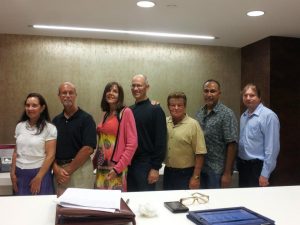
This isn’t hard to understand. Think of what year I’m talking about. I was forty nine in 2007. Pokemon Go and Bitcoin were words people had still never heard of. Imagine trying to explain these things before they existed. Giving an elevator pitch was no easy task. Facebook was just starting to take the place of MySpace. Google had just put the final nails on the coffin of Yahoo and AOL. Me, I was driving for Yellow Cab to make ends meet and then one day I ran into a guy who saw the entrepreneurial spirit in me. He promised he would invest in the Ghost Machine if I would help him with his own invention – a shopping cart washing machine.
In those days, I had come to realize that if I served others with their dreams, maybe my own dreams would find a way. I started the South Florida Crowd Funding organization and wrote business plans for entrepreneurs. I was active in a startup guild. I learned all I could about how to start a successful business. Yet for all of my giving to the community, no one except this one odd man offered to help me. He was not a good man. He was worldly. And he was mean. Life had taught him to be that way, I think. But he was more generous when he had money. I got to know him as a full time driver when he was doing well with his own company. He invested $5,000 into my project up front. And he paid me generously at first. But he had problems. Firstly, he had legal problems. He had lost his license due to drunk driving. That’s why he needed a driver. And then not long after, he got caught driving with a suspended license. I think he was telling me the truth when he said that one of his business associates had set him up as he was merely moving his ferrari in the parking lot so it wouldn’t get towed. He used to own a very successful car dealership in Canada. He was continually trying to teach me that the art of sales was to tell the truth, but to let people assume what they want. He tried to get me to stop warning people about the weaknesses and flaws in products and services. He surrounded himself with people who had that same worldly good sense and found himself tricked in the process, I think. His own business partners wanted to steal his technology, which he himself had probably craftily acquired from someone else. He never seemed smart enough to have invented what he claimed to have intellectual rights over. And then he lost control of it. After postponing his hearing about driving with a suspended license as long as he could, he served some time in jail and in the three month period he was away from his company, he lost control of it.

But I was still working his office at that time, not just driving for for him while he wasn’t in jail. I was helping him build traffic to his web site through a news magazine for the supermarket industry I had created called Supermarket Green News. You see, back in those days, web sites were easier to get attention for without much investment. The market wasn’t dominated by social media companies. I was helping him attract industry executives using my inventive web strategies. He had agreed to keep paying me for this even after he was in jail. But like I said, he surrounded himself with worldly people. Unfortunately, the money ran out when his business partners embezzeled it all. His BOD had a coup d’ etat, which I was well aware of. So as a witness, when he returned from jail after three months to find his company was no longer his, stolen by henchmen of the famous ponzi schemer, Scott Rothstein, in fact, he was left standing in a long line of people that Rothstein, (now in protective custody), was being sued by. Now being too heavenly minded to be any earthly good, as my father used to say, I knew my cart washer friend would never get justice but I couldn’t just abandon him, knowing he had been robbed. Even though I didn’t like him at all, that would have been wrong of me. Certainly in this case, if not in the others I was less privy to, he was still in the right. And he surrounded himself daily with people who promised to invest in his company. There was always a glimmer of hope, but they led him around. “If they will, I will too,” we would commonly hear. Nobody wanted to jump in first to actually invest.

They used him. This is something not many understand. CEOs for start ups get treated like the tires on the cars he used to sell. They get kicked by speculators who are only humoring the salesmen as they price hunt. They keep saying they need just one more thing. And then when that thing is supplied, then it’s another. Who really cuts a check for a start up? So at my 7×7 year, the new threshold was … the big kick. You can’t really start anything new. It was like satan himself was sticking his tongue out at me – kicking me while I was down. And it wasn’t even about me. He was kicking down this other guy I was trying to help – someone I didn’t even really respect. But that guy, the guy with what I considered bad character, was the only person who’d ever offered to help me, and even really done so. I was perplexed as to why there wasn’t anyone else. I was utterly humbled.
I was humiliated, not just humbled really. With satan, when one thing goes wrong, everything must go wrong. Not getting paid left me hunting for other revenue. The Elijah bishop had come back into the picture as one of the many people my washing machine technology friend had asked for investment help from. The bishop wanted me to put his college’s web courses online. Back on the road again for Yellow Cab as well, my usual taxi clients – addicts, strippers, prostitutes – were carrying on at that time. Lisa was not happy as I confessed some of what happened in the night. She was worried I might be unfaithful. It was a mistake to be so open but I didn’t like secrets. I’d overcome porn addiction in my twenties. I wanted accountability. If somebody took their clothes off in the back seat of the cab and then climbed to the front offering themselves for money, thanks to my commitment to honesty, I was able to act professionally. But then one night I called her to come pick me up on Blue Heron Blvd because my Yellow Cab van had been completely shot up by bullets in a drug deal gone badly. The van was thoroughly destroyed. It looked like a scene from Bonny and Clyde. She was frightened by the sight and was fed up. And then there was her own struggle.It turns out she had been having an affair that year. She had also turned to heavy drinking. Any little thing I did turned into an excuse for her to drink what little money we had away. It was a hard time. It wasn’t just any guy she was fooling around with. It was the guy she dated before she met me. It was a guy who tried to talk her into moving to the other side of the state with her. It was the guy who tried to coach her on how to get money in a nasty divorce. Yeah, that was forty nine. That was the 2007’s. It wasn’t enough to lose a fortune. I had to lose everything, even her.
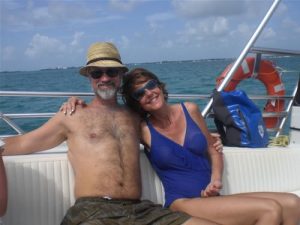
Maybe that was the thread that ties all this together – matrimony, or the struggle thereof. It would be a very sad and pointless story if that was all there was to it, I think, but then another miracle happened. She came back. She came back and I forgave her. She was repentant. I’ve put some thought into it and do you want to know what I think? I think that matrimony and the message of Elijah are one and the same. Preparing the way of the Lord … what is that? It’s preparation of the bride of Christ in repentance. Matrimony is a shadow of that union. It strips both the husband and wife of all pretension. And when the two witnesses preach in the last days, aren’t they dressed in sackcloth and ashes? Aren’t they repentant as they measure the temple? Look it up and see. It’s in the eleventh chapter of Revelation. Sometimes I wondered whether the two witnesses were a man and a wife.
So let’s wrap 7×7 up. I’ll admit that I can be naive enough to kick around but I believed her. and I was right. I may have been too heavenly minded to be any earhtly good, but I knew repentance when I saw it. I could sense the miracle happening and I wasn’t going to stifle it by ending the marriage even if there was valid reason. My only doubts were about me. Could I be strong enough to forgive? Theory is one thing. I knew the ideal thing to do in a world where I was a better man. Practice is another. And try as we did, reconciliation didn’t make life wonderful again. The hurt needed healing and we were just as broke as ever – even more so. We had to start life over from scratch, from a very deep hole we’d fallen into. And I haven’t even mentioned the stroke. Have I?
Oh yes. The stroke. Life’s stresses continued. It rained and it poured. Lisa had been paralyzed from a major hemmhoragic stroke in 2003 actually. I skipped over that part. The doctors were surprised she survived. She’d been in a coma for a week and it took her three months to take her first steps. 2003 hadn’t been any special seven year time. It was a year after losing her job at the Palm Beach County Convention and Visitors Bureau. That’s when her drinking got out of hand. She was spending money we didn’t have and then the cheating. She just wasn’t in her right mind. And then to add to my woes, a year after her stroke, my sister was also paralyzed from a stroke, still in that same difficult stretch of time, and her husband abandoned her. But Lisa and I reconciled. And that was that. It was a rough patch, alright, and there was nothing easy about it – just that long hard part there in the middle of yet another seven year stretch.
So what about my seven year theory? Forty nine passed. What about fifty six? Did anything new happen? Or did it just keep raining?

7×8
Maybe there’s nothing to it. What happened at fifty six is I moved to Tallahassee because my sister’s husband abandoned her because he couldn’t take the celibacy that came with having a wife who was paralyzed from a stroke even worse than Lisa’s. At least my sister, Corinne, hadn’t cheated on my brother-in-law. But she was in a nursing home, alone, abandoned, on a feeding tube, delerious from a psychotic depression that had been getting worse year by year. Imagine ten years on a feeding tube. At fifty six I became a caregiver. I knew I had to move to Tallahassee and focus on my family. I put all my entrepreneurial ideas on a low burner and closed the distance between us all – my wife, my sister and my older brother too. He’d become a recovering crack addict. I knew I wouldn’t have many more years to see him. It wasn’t easy. And Tallahassee had a way of keeping me unemployed and unable to pay bills. I juggled three part time minimum wage jobs. I was dying financially until Uber became a reality in Florida.
Note to the world: if you are going to be an entrepreneur, you’ve got to have some form of income while you work your concept. For me, Uber was perfect for that. And it didn’t involve friending people of the night just to get regular clientele, or relying on people with low moral standards. The passenger prospects were out at night, alright. But the system’s dispatch actually provided a fair volume of trips and I didn’t have to pay rent for a cab every week. I could drive my personal car. I could make my own hours.

I should qualify that. It’s better than what I’d been doing, but still not enough. Tallahassee is seasonal. It’s a college town. So in the summer time, I was left scurrying for income. That’s why I took a lending job I hated so much. I told you about that in another blog. Uber made it possible for me to quit that lending job in the fall. But summer of 2016 was still really hard and summer of 2017 was even harder. I looked for jobs I could do and still take care of my family but wasn’t finding anything that made sense except driving jobs and the ones that paid most were those that required a CDL. 7×9 anyone? Hold on. We’re almost there.
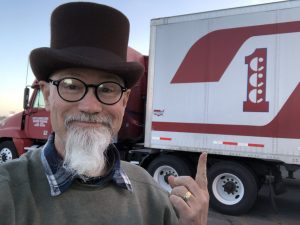
Corinne died in 2016 and Chris died in 2017, right after I finished CDL school and before I actually started driving an eighteen wheeler – something I couldn’t do while my brother and my sister were still alive – and something that doesn’t work very well nevertheless because Lisa needs me to stay nearby at all times. I was on the road for two years, trying to get home on weekends, before she started insisting she couldn’t take it any more. The trucking companies would keep me out for months at a time, far from home. A category five hurricane came close to the apartment while I was on the road over a thousand miles away. I will say that I needed the time alone. I needed to regroup. I needed the simplicity of thinking while I drove. It was that freedom I felt on that bike at 7×1 that set my mind thinking. Maybe it wasn’t the age, or the number seven. Maybe it was the motion. Maybe it me being in the place where I’m my best – a place far away from the bother of other people.
Still, I know my obligations. I came home to my wife and children when they needed me. I came home quite full of thought actually. I came back with an entire philosophical system, in fact.
7×9
The Pamalogy Society opened its doors when I was 63, when I started Season One of the podcast. Pamalogy stands for Poly Astronomically Maximized Awesomeology. It’s a mouthful. Start on the last word and work your way back to the first. It’s awesomeology – the philosophy of awesomeness. What is awesomeness.
I assume if you’ve read all this that you are interested in who I am and what I think. So, it shouldn’t be too strange if I mention that “maximized awesomeness” has been my life’s motto for many many years. To bring this story full swing, I should tie it all together with this theme. I told you I believed in God but had my doubts about the incarnation. I’m a horrible Orthodox Christian, really. Some might suppose I’m a heretic. I don’t let that bother me. I’m not trying to please anyone else by pretending I agree with them. How genuine and tranparent would I be if I did that? I don’t need anyone’s acceptance. I’m getting to close to my final years to be anything but true to myself. My belief in God is based on what I am certain of. Let’s start there. Why am I so certain?
Well, I think it is worth it to consider some things that may not seem to fit very well with your personal religious tradition. For one thing, it has never escaped my attention that the odds of my very own consciousness existing at any point in time, including the point in time we call now, that we suppose moves along, are next to infinity to one. What I mean is, if time were to extend infinitely into the future, as a majority of us probably suppose, and also into the past some very great length of time, if not into eternity past, then the relation between the length of our assumed lifespan, assuming we think it to be seventy to eighty years before we die if we live an average length of time for humans, is infinity to some relatively very small number of years. That means that if our consciousness is to exist only for the length of time we suppose, that odds are we should have either a very great amount of time before we will be born, or a very great amount of time since we’ve been dead. The one thing we shouldn’t be, if we are to have a life of just seventy to eighty years, is living that life at any given point of time, except for a few very short ones. Nevertheless, this is the common assumption, certainly in the West and among most materialist physicists and cosmologists and such.
But why should we assume that? The evidence we have for it is that we experience being alive. Therefore, we assume that being alive is what we are. But odds seem to beg for a better explanation. Odds would say it would be more likely to be alive at any given time, such as now, if life lasted forever. That way it might be infinity to infinity, rather than seventy five to infinity. Or perhaps, the odds would also be in our favor under a different supposition. Suppose there was no such thing as time. But rather time and space were subject to some power other than time and space that brings consciousness to the points of time and space appropriate to it. Now if that is the case, then there is nothing to stop us from living in an eternal state that includes all of our conscious states throughout a lifetime but only perceived according to the constructs of assumed space-time. Either of these two paradigms would explain why we are conscious at a particular moment and not not yet born and not long dead.
When considering this and considering the Christian and Muslim paradigm that supposes one life is lived for 75 years or so and this is followed by eternal life, then we are left with the problem of the passage of an eternal past. Paradoxically, if an infinite amount of time has passed, then we should never have arrived at this moment in time. This thought alone has brought many philosophers and cosmologists to agree that the past cannot have been eternal. Of course, they seem to love atheism and dismissing religious myths as fiction. So rejecting the notion of an eternal past is just one more point of tradition they can mock. But let me return to my certainty about theism and what is significant about the notion of the maximization of awesomeness.
Simply put, God is Maximized Awesomeness. Here me out.
We should start with a certain set of ideas we can agree on about what God is if God exists. If God exists, we expect God to be perfect. By perfect we mean that than which there can be nothing better. There can be no greater good.
Now while the concept of a greatest possible good may be inconceivable in its detail, it is not inconceivable in terms of its own self entailment. To be that than which there could be nothing greater, means to have more goodness than anythning else, and we might also suppose that if two things had every possible goodness but one had more badness than the other, that between the two the one that contained no badness would be better than the one that did have some badness. Therefore, to be that than which there could be nothing greater would be to possess all possible good things and to possess no bad things.
This is, of course, a very tall order. Nevertheless there is one place where we can trust the fullness of such a thing exists, and that is in the realm of pure possibility. Moreover, it is in consideration of just some of the various things that we could agree on that would be good, that we can ultimately conclude that Maximized Awesomeness is real, and not merely a concept. To begin with, however, we also need to clarify what is meant by being real. By being real, I would include two sets of things, one that exists as abstract possibility and another that exists beyond abstract possibility in any other reality. And we can say that abstract possibility itself is not real, unless that abstract possibility includes in itself something that creates somethingness out of nothingness – in other words – produces realities of itself out of nothing but the pure information abstract possibility is.
The question involves phenomena that quantum physicists haven’t come to understand. They theorize about sub-atomic particles and do tests that prove their formulas accurate. However, they do not understand, or even have a theory for how or why these sub-atomic particles, these quarks, leptons and so on, exist or act the way they do beyond theorizing that they exist on account of “fields.” So far I have heard no explanation for the existence or operation of these fields. But I have heard many admit that the fabric of reality appears to be information. By “information” is meant the particular motion and relationship of these fields and smallest particles, despite their lack of mass. Perhaps they exist as pure energy and serve like a computer, as data that forms the matrix of reality.
That information is capable of giving rise to material worlds seems to indicate that pure information would also give rise to the smallest particles that are in turn serving as that information which comprises the algorithms of reality. We can keep drilling down to theorize about information causing material or energy, that is subsequently itself causes by information. I don’t need to know the formula for it all. Instead, I think about infinite divisibility to zero. What is the limit to zero? And what is the limit to the limit to zero? Does that require something to exist? Or does it require nothing to exist? Would not all matter be made of something that small? It would seem then, that the first something, a limit to zero, at one angle, would be capable of setting all the momentum necessary for the rest. So, it is not inconcievable that pure possibility, as the totatlity of all possible information, having zero weight, would be the weightiest thing up to the presence of something, which if a limit to zero, is essentially zero.
I say all this to offer the possibility nothingness might indeed possess what the creation of somethingness requires. But now let’s turn to what is contained as pure information within the realm of pure possibility. Among the inconcievably great number of things all possibility includes, is that than which there could be nothing greater – God, or to put it another way – the possibility of Maximized Awesomeness.
What are the things that are included in this particular possibility? Everything that would be good. Nothing that would be bad. An exhaustive inventory of what would constitute good or evil. The possibility of self-awareness of itself and all that would or could be good in that very holiness. The formula for its own self-realization.
I would ask then if there is anything in reality that could add to its goodness and the answer is no. Those things must also be included because the inclusion of those things is possibility, as well. Therefore, all of the information we call reality is contained by Maximized Awesomeness within pure possibility, and in Maximized Awesomeness is contained all sorts of good things – like the ability to make all good things real, the formula to do so from nothingness so that nothingness never is, and the restraining of all possible evil.
I speak of formulas. I mean algorithms comprised of the information which pure possibility contains. I am not referring to some chemical formula that requires material things and energy to come to be. I am talking about computational algorithms. I am talking about the inherent quantum software in pure possibility since pure possibility contains all possible information, including those algorithms that create all possible realities from nothing.
The more difficult thought is not how something exists instead of nothing, if there was ever nothingness in every Universe, but how how good restrains evil. If Maximized Awesomeness is realized through pure possibility, then why is not Maximized Awfulness also realized by it? The answer is the restraining power of Maximized Awesomess over Maximized Awfulness that stems from its character. Maximized Awesomeness is harmoniuous in all that is good. Maximized Awefulness is chaotic in all that is evil. Chaos must destroy other chaotic things to maximize its chaos, not just the good – whereas, for the good to restrain all evil, it only needs to defeat evil, not itself. It renders evil non-existent.
This is the point of resistance I find in people contemplating the possibility of God. They see evil and conclude very quickly that God cannot exist because if they were God, they would not have created a world that would allow chaotic things to happen. Everything would be good.
Many have supposed that God allows chaotic things for the sake of free will and this is met with many arguments opposing free will. Mainly, the argument about free will seems insufficient because God seems to be skirting responsibility by blaming others for evil that He would have foreseen but permitted anyway. That sort of argument seems to me to be won by the opponents of the God theory. Instead, I propose that evil is never realized.
It may seem preposterous to say that evil is never realized, but I think it must be so if Maximized Awesomeness is true. I did not yet prove why I think Maximized Awesomeness is true above. I needed to also mention three other things – first, the moral imperatives that exists in the concept of goodness, which also has the formula for performing the good from nothingness, which is part of the possibility entailed by Maximized Awesomeness.
second, I need to mention the self-awareness, which similarly, must also be part of the possbility entailed by Maximized Awesomeness. I mean not just awareness of itself as being a being, but of all things it entails, including its own moral obligation, and its awareness of its power, and the knowledge of how to manfiest all of reality as itself. And indeed, to add that which is less than itself to reality to the extent that all lesser but holy and wholly good things also exist.
Third, I need to mention will, which similarly, must also be part of the possibilty entailed by Maximized Awesomeness. Intention and will are subparts, I suppose, of Self-Awareness in Maximized Awesomeness. I add this third part to show that pure possibility can have a will.
Such are the inner qualities of the possibility of God, and in them, as I’ve pointed out, are the knowledge of, the moral imperative to, and the power of making happen the realization of God by God as both purely immaterial spirit, and simultaneously, the totality of reality. And the reason is that it would be good if this were true and this truth is contained in the pure information which constitutes all possibility. But, as I said, we have the problem of evil, which we believe we see.
Quite simply, evil must be a convincing illusion. That is why believe it exists.
Now I can think of many ways in which convincing illusions of evil might serve good purposes. In fact, I have never heard a description of any evil that if it were nothing more than a convincing illusion, would have at least some good thing that by its supposed existence would prompt some good. And together with the fact that time and space seem to serve consciousness, when observing probability, as I first mentioned, I find in the paradigm that all things happen (where and when is not necessary), something consistent with a higher mind over matter, producing by the help and power of realized Maximized Awesomeness, time itself and all realized experience. I won’t add “never ending” to this description because if time is merely part of that grace produced consciousness tied in to an evil negated illusion, then the word “time and even the word “always” belong to a different sort of paradigm. Only the good exists. Time skips from good to good, but also repeats in a sustaining chorus, understood in the all knowing knowing, that also knows unknowing.
This is why I have always believed Maximized Awesomeness was true. In other words, this is why I have always believed in God. Thus we have the final two words in Pamalogy. Now let’s take a quicker look at the first to words – “Poly Astronomical.” These refer to the Multiverse. They mean “many universes.” If Maximized Awesomeness is true, then there are as many universes as it takes to exhaust every good possibility – all while using the convincing illusion of evil as a stepping stone to types of good that couldn’t exist otherwise. For instance, It is not possible to be healed without injury, but one can experience the knowledge of being healed via the convincing illusion of an injury. Similarly, one can forgive sin they believe to be real, but which is actually just something they were convinced had been a sin, but may not have been. This makes the forgiveness itself no less real. And again, if a tsunami seems to wipe out a village and prompts all sorts of service and compassion and prayer, then the service, compassion and prayer are real, whether the tsunami or the suffering people were real or not.
This, I think, is a much better reconciliation between what seems like evil and the God theory. Once we realize that time doesn’t exist, nor space, the existence of nothing but goodness is easier to see. It may not be of this world, but it is in this illusion as a point of grace, experiencing a moment of it being itself and doing what it does. In 7×9, I came back from a long journey, ready to explain this. I came back home, and created Season One of the Pamalogy Society podcast. At this time, I remain a humbled man by my circumstances. I took Uber up on a scholarship offer and completed anotheer degree. This one was in interdisciplinary studies with concentrations in organizational leadership and philosophy. I felt the need to articulate my philosophical system in a way that would be understood by other philosophers. When I founded the Pamalogy Society, that was the year that I realized who I was. I was a philosopher.
